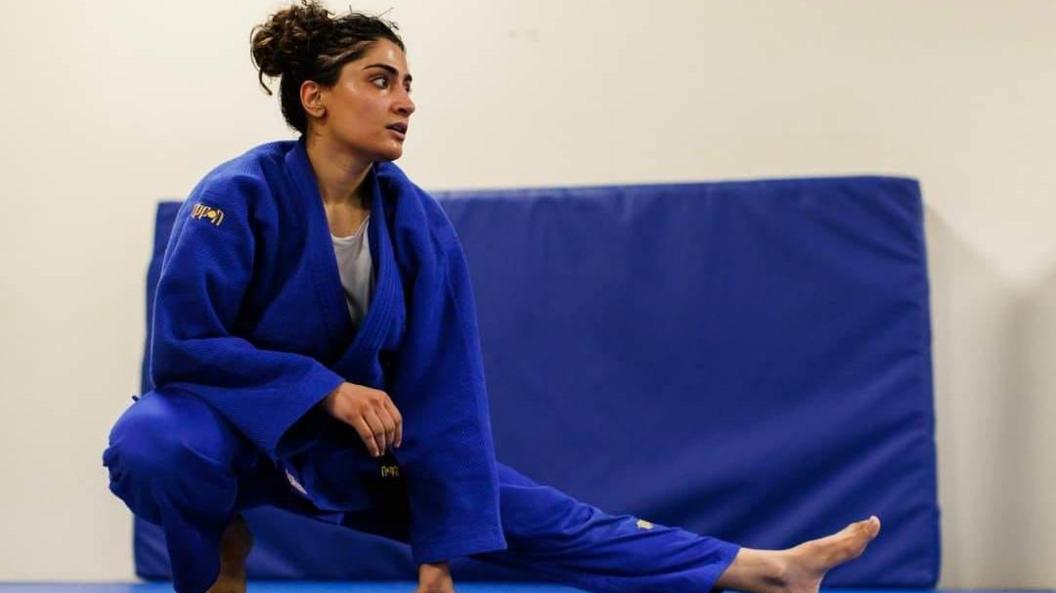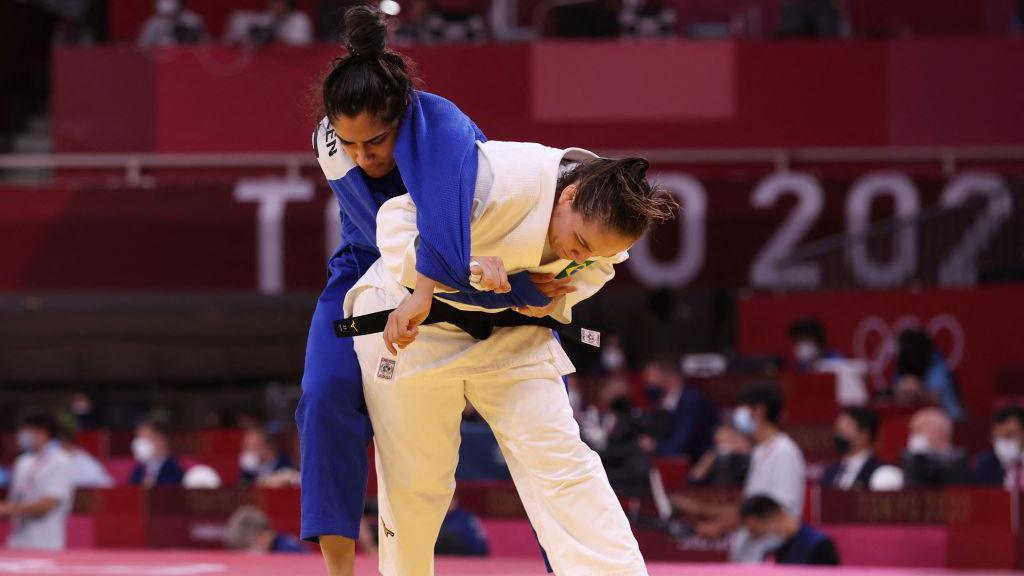How a refugee Olympian found a new life in Canada

Judoka Nigara Shaheen is competing in women's judo at the 2024 Paris Olympics
- Published
Nigara Shaheen’s journey to becoming an Olympic judoka did not begin with judo.
Instead, it began with a 30-minute karate lesson on her family’s balcony in Peshawar, Pakistan.
She was 11 years old and had already been a refugee for most of her young life, having fled her native Afghanistan in 1993 with her parents as an infant, her mother carrying her as they walked two days and nights through the mountains to safety.
She has faced many more obstacles to fight in the sport she loves, in between her first-ever karate lesson and competing in the Paris Olympics as part of the Refugee Olympic Team.
Since 2022, the 31-year-old athlete has been living and training in Toronto.
As a young student in Pakistan, Ms Shaheen faced harassment by older men on her way to the refugee school she attended, and bullying by her peers.
In an essay in the Toronto Life magazine, external, she recalled: "One day, an older man assaulted me and my sister. He screamed at us and pushed me to the ground. I wanted to punch and beat him, but I didn’t know how."
Her mother said she needed to learn how to defend herself.
The school she attended didn't offer martial arts or other after-school activities for students - even if it had, it would often close, sometimes for weeks at a time, she told the BBC in an interview from Paris.
But through her extended family, she heard about an instructor who was coaching karate at a nearby school. He couldn't train her there, but he could come to her.
Soon after, Ms Shaheen was on the balcony at her aunt's home, getting coached.
Her mother told her the balcony was all the family had to offer “but you can use it as much as you want”, she recalled.
Not long after, Ms Shaheen was fighting in local karate tournaments. Her coach, noticing her talent and passion, suggested she try competing in judo.
“I asked him ‘what’s judo? And how would I know what to do?’ He told me: ‘Just grab your opponent and throw her, that’s it,’” she said.
Ms Shaheen was able to take down her first opponent in a few seconds. She had a knack for the sport.
While winning felt good, it was the philosophy of judo that got her hooked.
“(My first coach) said you will not learn how to get up unless you fall. As a kid, that really motivated me,” she said.
It also reminded her of watching the WWE with her father, a wrestling fan, as a child.
The sport gave her the confidence to find herself - and joy in her life - despite the hardships she faced as a refugee.
Ms Shaheen’s coaches began to notice her talent. At one point she trained with Pakistan’s national judo team but could not compete alongside them without a Pakistani passport.
In 2014, Ms Shaheen returned to Afghanistan, where she studied political science and public administration at the American University in Kabul.
She also trained with the Afghani national team, were she was welcomed by her male colleagues.
"Inside the gym, we were a family, and they treated me like I was their sister," she wrote in Toronto Life.
She continued to train and compete, and began to receive a lot of attention as a female athlete in Afghanistan - some of it unwanted.
“I faced immense cyber bullying,” she told the BBC. The harassment later turned physical.
“There were so many times when cars would chase us,” she said. Once, someone threw a soft drink can in her mother’s direction as she was dropping her off at practice.

Ms Shaheen suffered a shoulder injury during her first match at the Tokyo Olympics
She left her home country again, in 2018.
“I always say that I became a refugee for a second time,” she said.
She moved to Russia for her master’s studies in international trade and entrepreneurship. But unlike the welcome she received at her gym in Afghanistan, she couldn't find a training partner in Russia.
She spent the next year training alone - a time she has called "the worst days" of her career.
In 2019, she was approached by an International Judo Federation member, who suggested she try out for the Refugee Olympic Team.
She qualified for the 2020 Tokyo Olympics, but a serious shoulder injury knocked her out of the competition.
By then she had finished her studies in Russia and the situation in Afghanistan had deteriorated drastically.
“I was just stuck,” Ms Shaheen said.
She returned to Pakistan where she mostly stayed at home in fear of her safety - she had faced criticism for not wearing a headscarf during the Games - and contemplated her next steps.
Fleeing Kabul, chasing gold - the story of a refugee Olympian
- Attribution
- Published20 June 2024
'I'm proud to represent the refugee team at Olympics'
- Published23 July 2024
Refugee boxer to be Paris 2024 Olympic flagbearer
- Published25 July 2024
That’s when the opportunity to live and train in Canada opened up, with the help of the Olympic Refugee Foundation and United Nations Refugee Agency.
Ms Shaheen was accepted to study in Toronto for a postgraduate degree in international development.
She arrived in September 2022 - a bittersweet moment for the athlete who had already journeyed through three countries in search of stability.
It was in that Canadian city where her judo career was given a new lease on life.
“I was so happy to finally be at a place where I can be myself,” she said. “But it was also hard for me because I had to say goodbye to my parents for the second time.”
In Paris, she is one of the 37 athletes playing for the Refugee Olympic Team - a team Ms Shaheen is grateful to be a part of.
“I feel really proud,” she said ahead of her first competition on Tuesday against Mexico’s Prisca Awiti Alcaraz.
“I’m as much of an Afghan as I am a refugee,” she said. The banner for the refugee team is “a flag that I can relate to”.
While she lost to Ms Alcaraz, Ms Shaheen has said that she is thankful to be able to compete at the highest level.
"Even with every loss, I learn something new."
She will appear on the mat once again on Saturday, where she will represent the Refugee Olympic Team in the mixed team event - her first time doing so.
"Team events are more exciting since I always look at my teammates and feel like I can’t let them down so I fight for all of them," she told the International Judo Federation ahead of the competition.
After the games, Ms Shaheen plans to call Canada home - she is now a permanent resident - and she hopes to one day work to assist refugees like herself.
Her parents are still in Pakistan, where they are cheering her on as she lives out her Olympic dream.
At her lowest points, she said she would lean on her family for support.
“My sister used to tell me, ‘I trust that one day you will achieve something big, and this will be a memory and you will laugh about this.’”
“Now is the time that I laugh about it.”
